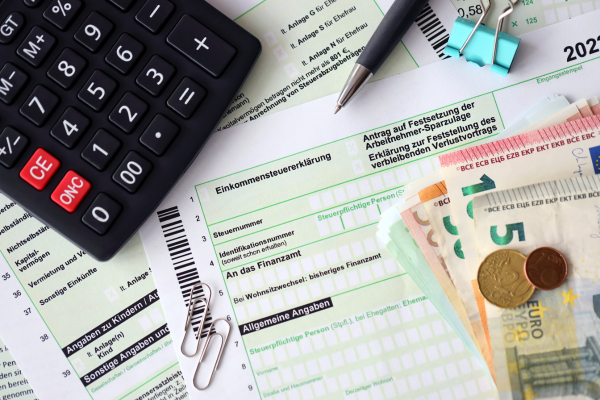The Complete Guide to Deductible Medical Expenses on Your German Tax Return

Medical expenses can add up quickly, but in Germany, many of these costs are tax-deductible. From prescription medications to major surgeries, understanding what qualifies as a deductible medical expense can help you lower your tax liability. This blog post provides a comprehensive guide to deductible medical expenses in Germany, ensuring that you don’t miss out on valuable tax savings.
Outline:
- Overview of what qualifies as a deductible medical expense in Germany.
- How to claim deductions for prescription medications, treatments, and surgeries.
- Deductions for health insurance premiums and out-of-pocket costs.
- Documentation required for medical deductions.
- Filing your tax return with medical expense deductions.
Overview of What Qualifies as a Deductible Medical Expense in Germany
In Germany, medical expenses can often be deducted from your taxable income, reducing the amount of tax you owe. Qualifying medical expenses typically include costs for treatments, prescription medications, surgeries, and other health-related services that are not fully covered by health insurance. Expenses related to alternative treatments, such as homeopathy or acupuncture, may also be deductible if they are prescribed by a licensed medical practitioner. To qualify for deductions, these expenses must exceed a certain threshold, which is determined by your income level and family situation. Understanding what qualifies as a deductible medical expense can help you manage your healthcare costs more effectively while optimizing your tax return.
How to Claim Deductions for Prescription Medications, Treatments, and Surgeries
To claim deductions for prescription medications, treatments, and surgeries in Germany, you need to itemize these expenses in your annual tax return. Start by gathering all receipts and invoices for medical costs incurred throughout the year. Only the portion of these expenses not reimbursed by health insurance can be deducted. When filing your tax return, include these costs under “Außergewöhnliche Belastungen” (extraordinary burdens). This section of the tax return allows you to list expenses that exceed a specific threshold, based on your income. By properly claiming these deductions, you can significantly reduce your taxable income.
Deductions for Health Insurance Premiums and Out-of-Pocket Costs
Health insurance premiums in Germany, especially those paid for private health insurance, can be deducted from your taxable income. This includes both the basic health insurance coverage and any supplemental policies you may have. Out-of-pocket costs, such as co-payments for medical services, prescription drugs, and other health-related expenses not covered by insurance, can also be deducted. These deductions are typically listed under “Sonderausgaben” (special expenses) on your tax return. Taking advantage of these deductions can lower your overall tax liability, making healthcare more affordable.
Documentation Required for Medical Deductions
Accurate documentation is crucial when claiming medical deductions on your German tax return. You need to keep all original receipts, invoices, and proof of payment for any medical expenses you plan to deduct. Additionally, if you are claiming deductions for treatments or medications that were only partially covered by your health insurance, you should include documentation of the reimbursement from your insurance provider. It’s also important to retain any prescriptions or referrals from your doctor, especially for treatments that might be considered non-standard. Proper documentation ensures that your claims are accepted by the tax authorities, maximizing your potential deductions.
Filing Your Tax Return with Medical Expense Deductions
Filing your tax return with medical expense deductions in Germany involves carefully itemizing all eligible expenses under the appropriate sections of your return. Use the “Außergewöhnliche Belastungen” section for most medical expenses and the “Sonderausgaben” section for health insurance premiums. Ensure that you meet the required threshold for medical deductions, which is a percentage of your income. Submitting your tax return via ELSTER, Germany’s online tax filing system, is the most efficient way to file. Double-check that all documentation is in order and consult a tax advisor if you are unsure about any aspect of your filing. By including all eligible medical deductions, you can reduce your taxable income and lower your tax bill.
Disclaimer:
The information provided in this blog post is for general informational purposes only and does not constitute tax, legal, or financial advice. While we strive to ensure the accuracy and timeliness of the information, tax laws are complex and subject to change. We recommend consulting with a certified tax advisor for advice tailored to your individual circumstances. In terms of financial consultation, we collaborate with German Sherpa Financial Solutions, specializing in services for Expats in Germany. Please note that this content does not serve as tax consulting.
Home Office Deduction in Germany: How to Claim It and Maximize Your Savings
Home Office Deduction in Germany: How to Claim It and Maximize Your Savings With the…
Tax Classes in Germany (Steuerklassen): What You Need to Know
Tax Classes in Germany (Steuerklassen): What You Need to Know Germany’s tax system uses tax…
Tax-Free Savings in Germany: Making the Most of Your Allowances
Tax-Free Savings in Germany: Making the Most of Your Allowances Tax-free savings allowances in Germany…
Income Thresholds, Tax-Free Amounts, and Tax Brackets
Income Thresholds, Tax-Free Amounts and Tax Brackets Germany uses a progressive income tax system, which…
Claiming Moving Expenses on Your German Tax Return: What You Need to Know
Claiming Moving Expenses on Your German Tax Return: What You Need to Know Moving for…
How and When to Change Your Tax Class
How and When to Change Your Tax Class Changing your tax class can have a…
How to Deduct Childcare Expenses on Your German Tax Return
How to Deduct Childcare Expenses on Your German Tax Return Raising a child in Germany…
Filing Your Taxes in Germany: Your Options
Filing Your Taxes in Germany: Your Options In Germany, tax returns (Steuererklärungen) are usually due…
Who Can Legally Help You File Your Taxes?
Who Can Legally Help You File Your Taxes? In Germany, only certain professionals are authorized…
Top Strategies to Legally Reduce Your Taxes in Germany
Top Strategies to Legally Reduce Your Taxes in Germany Paying taxes is a part of…
Maximizing Your Tax Refund in Germany: Tips and Tricks for Expats
Maximizing Your Tax Refund in Germany: Tips and Tricks for Expats Getting a tax refund…
How to Optimize Your Tax Class to Save Money in Germany
How to Optimize Your Tax Class to Save Money in Germany Choosing the right tax…
Exploring Tax Deductions: How to Lower Your Taxable Income in Germany
Exploring Tax Deductions: How to Lower Your Taxable Income in Germany Tax deductions are one…
The Best Tax-Saving Strategies for Families in Germany
The Best Tax-Saving Strategies for Families in Germany Families in Germany can take advantage of…
What Can You Deduct? A Comprehensive List of Tax-Deductible Expenses in Germany
What Can You Deduct? A Comprehensive List of Tax-Deductible Expenses in Germany Knowing what expenses…
Understanding Tax-Free Allowances and Flat Rates in Germany
Understanding Tax-Free Allowances and Flat Rates in Germany Tax-free allowances and flat rates are essential…
Claiming Work-Related Expenses: How to Reduce Your Tax Bill in Germ
Claiming Work-Related Expenses: How to Reduce Your Tax Bill in Germany Work-related expenses are some…
Donations, Insurance, and More: How to Maximize Your Tax Deductions in Germany
Donations, Insurance, and More: How to Maximize Your Tax Deductions in Germany In Germany, certain…
How to Deduct Education and Training Expenses on Your German Tax Return
How to Deduct Education and Training Expenses on Your German Tax Return Investing in education…
















